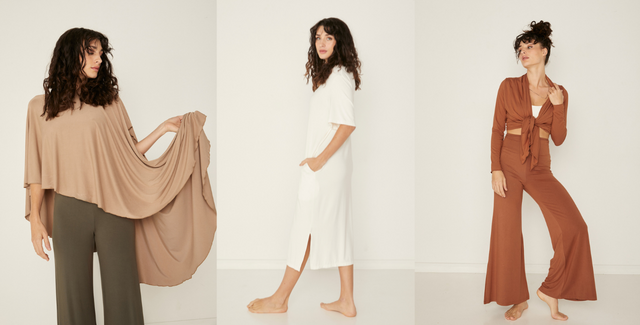The term "ethical fashion" has gained traction in recent years. With climate change intensifying and more consumers demanding sustainable products, designers and brands are prompted to reevaluate their approaches.
But what is ethical fashion, and why does it matter? Explore the hazards of fast fashion and discover tips for mindful shopping in this ethical fashion guide.
Ethical issues in the fashion industry
The fashion industry, while celebrated for its creativity and innovation, grapples with a host of ethical issues that demand attention.
- Waste creation
The UN Alliance for Sustainable Fashion reveals a concerning trend: the average consumer now purchases 60% more pieces of clothing than they did 15 years ago. Alarmingly, each garment is retained for only half as long as it used to be.
This accelerated turnover in clothing ownership stems from the rise of fast fashion. This practice entails mass-producing garments that align with the latest trends. The goal is to boost consumer spending by speeding up trend cycles and keeping prices down by using low-quality synthetic materials.
However, all of this convenience and affordability comes at an environmental cost.
According to a recent report by The Australian Fashion Council, Australia imports 373,000 tonnes of new clothing every year, with 200,000 tonnes eventually ending in landfill. Clothing production requires resources like water, energy and raw materials. Importing large quantities can lead to substantial waste and pollution.
Moreover, materials used in production, such as synthetic fibres, may take a long time to decompose. When household or commercial waste isn't recycled or reused, it usually ends up in a landfill. Landfills can have devastating impacts on both terrestrial and aquatic environments, ranging from habitat degradation to soil contamination.
- Exploitative labour practices
Fast fashion brands cut costs by hiring workers from countries with low national minimum wages. According to a study, major fashion brands pay those in their supply chains two to five times below the living wage.
Workers in clothing factories across Asia, Latin America and Eastern Europe produce items for markets like the US, Canada, Europe, Japan and Australia. A Human Rights Watch report surveying over 340 individuals exposes harsh conditions extending beyond the work itself. Surveillance is enforced on bathroom breaks, with some workers reporting being denied them even when sick. Additionally, they are deprived of water and lunch breaks, all to meet the exploitative quotas set by the factories.
- Heavy carbon emissions
The textile and garment industry contributes around 6% to 8% of total global carbon emissions or 1.7 billion tonnes per year.
In the textile industry, energy consumption is the primary driver of greenhouse gas emissions. The wet processing stages, including dyeing and finishing, demand substantial energy for heating water and drying fabrics.
In fast fashion, high volumes of production can release a significant amount of emissions that may pose health risks and accelerate climate change.
What is ethical fashion?
Ethical fashion champions eco-friendly and socially responsible practices. It involves using natural and organic materials, minimising waste and endorsing fairer working conditions. Ethical fashion benefits not only those in the supply chain but also promotes a greener and healthier planet for future generations.
Additionally, ethical fashion brands foster a holistic approach, ensuring sustainable methods from production to disposal.
Tips for making mindful wardrobe choices
Consumers have the power to transform the fashion industry and make a positive impact on the environment.
Follow our ethical fashion guide towards mindful consumption:
- Buy less but invest in high-quality clothing
A minimalist approach fosters sustainability and longevity. Timeless, durable pieces resist trends, lessening the need for frequent replacements. Additionally, quality garments often incorporate ethical production and materials, minimising their carbon footprint. This conscious shift encourages a more sustainable approach to fashion consumption.
- Support ethical brands
Choose designers and brands that practise what they preach. They should be able to show proof of their commitment to ethical policies and methods.
Here are key questions to help you spot authentic sustainability and avoid deceptive marketing:
- Where are the products made?
- What materials are used, and are they sustainably sourced?
- What steps does the brand take to reduce its environmental footprint?
- Are the packaging materials eco-friendly?
- Does the brand have any certifications to validate its sustainable practices?
- How does the brand ensure proper working conditions for its workers?
Genuine ethical fashion brands willingly disclose information about sourcing and production, empowering shoppers to make informed choices.
- Take care of your clothes
Make your clothes last longer by ensuring proper storage and handling. Wash gently to prevent wear and tear. This reduces the likelihood of garments ending up in landfills after just a few wears. If something needs fixing, repair it, or consider donating instead of tossing it out. These steps not only extend your clothes' lifespan but also promote a greener and more responsible approach to fashion.
Shop elegant and sustainable Bamboo clothing
Combating unethical fashion practices requires action at every level, from governments to companies and individual shoppers.
At Bodypeace, we are committed to ethical fashion, from our choice of materials to our responsible manufacturing processes. Our easy-to-wear Bamboo clothes and underwear for women and men are designed to flatter diverse body types while reducing our ecological footprint.
Our unique Bamboo fabric, comprising 92% Bamboo and 8% Elastane, offers a luxurious and soft blend. We guarantee that our farmers receive above-award wages and work in safe and fair conditions. Additionally, we employ ecologically safe knitting and dyeing practices.
Browse our collection now and say yes to an eco-friendly lifestyle.









